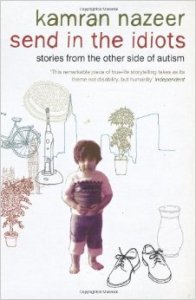Send in the Idiots – Kamran Nazeer
Disclaimer: The book and this review contain mentions of suicide.
A book written by an autistic adult who set out to find the other autistic children who were in his special needs classroom at school. It is a book about their lives, about what they have done, and what they plan to do in the future. Intermingled with the writing about his former classmates are bits and pieces about Nazeer’s life.
As we move through the lives of his former classmates, Nazeer moves between writing about his classmates lives and onto tangents related to their lives. There are brief departures for politics and speech writing in Craig’s chapter, shorts pieces on social coherence and puppet making in Andre’s, and discussions of poetry in Randall’s sections.
Craig began by mining his father’s speech-writing books. He learnt about the ascending tri-colon. The began to please him, thrill him, sustain him. He learnt about floating opposites. His confidence frew, his inhibitions diminished. He went to bed with a dictionary of quotations and folded the page whenever he spooted one with potential.
The accounts are not painted in a positive or negative light, but rather just presented as observations of, and interactions and interviews with people, covering multiple parts of their lives. One could argue that it would have been easy for Nazeer to write negatively about Andre, given the fact that he was locked in a bathroom by him during his time at his house for this book, but instead Nazeer presents a more matter-of-fact and comprehensive approach to each person and situation. He does not focus wholly on autism, but he does not push it to the side either.
So he (Andre) tries, as I saw him do when we were out, first of all, to reach local coherence, to protect himself by putting the more complex things into the background and focussing instead on tapping a pen against the surface of a table or lining up empty glasses. When that fails, the puppets are the next aspect of his strategy. And when the puppets fail, when someone talks over one of his puppets, when the local coherence that he has already tried so hard to attain seeps away, he loses his temper, suddenly, straightaway, with no pause for reflection.
Nazeer also visits the parents of a girl who was in his class, who committed suicide at the age of 26, but the chapter is not entirely about her death. Instead there is much written of her life, including how her parents tried to help her learn to use the bus system to travel around the city and after failing multiple times to use their own methods of knowing when to get off the bus, realised that she had her own system mapped out in her head.
The chapter where Nazeer meets up with two of his teachers does move into the area of discussing autism, recovery, and autism advocacy. His two former teachers declare that he is no longer autistic based on the young man they see across from them. Nazeer isn’t sure what to make of these declarations – indeed it is a controversial topic within autism. Some autistic people do say that they have recovered from autism – Temple Grandin being perhaps a famous example – and perhaps you could say it depends on what a person views as recovered. I probably would not ever use the term recovered from autism, but it is interesting to read Nazeer’s thoughts on the topic and where and how he disagrees with his former teachers. Nazeer discusses the topics of recovery and advocacy more in the epilogue, where he also wraps up with some discussions of benefits and difficulties his former classmates encountered in their relationships and interactions with other people – that were directly affected by the other people’s perceptions of autism.
There are viewpoints in this book that you might not expect and which can be quite divisive; certainly that last chapter and epilogue contain some controversial discussions. It makes for interesting reading. The chapters dedicated to the four classmates Nazeer wrote about are interesting and full accounts of very different people and the way they lived their lives. Nazeer has a very engaging writing style which makes it easy to keep reading.
Is it worth reading? Yes – there are controversial topics discussed but this book allows the reader to briefly meet five very different autistic people, and learn some other side-bits of information along the way.

[…] Send in the Idiots – Kamran Nazeer It’s covers some very divisive topics in the field of autism and introduces us briefly to […]
LikeLike